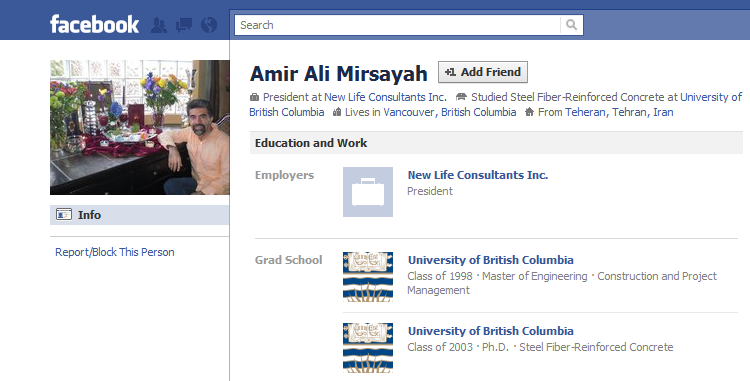Students can sometimes misbehave, just ask the UNA. Which is why, every year, UBC’s University Counsel office posts a summary of student discipline imposed by the President for both academic and non-academic infractions. In June, the summary for the 2009-2010 Academic Year was quietly released.
The most surprising revelation from the summary is that a student was expelled for making a death threat against former UBC President Martha Piper and her family. This is not merely a breach of UBC conduct, but a criminal action. The student was the only one forced to leave UBC permanently in 2009-2010. After Hwi Lee’s bomb threat against the BioSciences building in January 2008, there is no leniency given to students who threaten the lives of others, nor should there be.
- A student committed non-academic misconduct by composing and sending an email to former University President that threatened her and her children’s lives.
Discipline: Expelled from the University and a permanent record of the disciplinary action entered on the student’s transcript. (Summary #48)
However, this incident actually pre-dates the BioSciences threat by almost 5 years. In 2003, Ubyssey reported (page 3) a death threat against Piper and her family during a TA strike. Court records show that in 2005, a grad student named Amirali Mirsayah was found guilty of making the threats and sentenced to one year of probation. A subsequent appeal was denied in 2007. While the criminal case was occurring, the student requested that the disciplinary hearings be delayed. It must be noted that Mirsayah was not attending UBC throughout this time. Once it was clear the criminal case was over, UBC resumed the disciplinary process against him. Despite being expelled, he still lists having a Ph.D. from UBC. Perhaps appropriately, he also lists himself as president of a company called “New Life Consultants, Inc.”
As for the rest of the report on student discipline, the majority of the cases of academic discipline involve plagiarism or cheating. The penalty accompanying these infractions is generally a mark of zero in the course and/or a 4-8 month suspension from the university. While there is certainly far more cheating and plagiarism going on at a large university than is contained in the discipline summary, dozens of people do get caught every year and the penalties can be substantial.
However, the vagueness of the descriptions can lead to some head-scratchers about the standardization, or lack thereof, of punishment.
- A student committed academic misconduct by submitting a master’s thesis that was plagiarized from published sources.
Discipline: A mark of zero in the course and a registration block from the University for 12 months. (Summary #2) - A student committed academic misconduct by submitting his/her PhD dissertation in a course that was plagiarized from published sources.
Discipline: A letter of reprimand. (Summary #34)
At other times, the detail included can seem more than is necessary.
- A student committed academic misconduct by looking up answers to an examination question on the Internet using his/her iPhone while he/she was in the washroom for an extended period of time during a final examination. (Summary #20)
It’s safe to say this certainly never would have happened with an Android phone! Even more interesting are the instances of non-academic misconduct.
- A student committed non-academic misconduct by committing a break and enter into the University parking kiosk.
Discipline: A letter of reprimand. (Summaries #9 and #10) - (ii) non-academic misconduct of harassment and forgery by sending a note that contained offensive comments to his/her instructor and that he/she forged the name of another student in his/her class on that note.
Discipline: (ii) a suspension from the University for 4 months for non-academic misconduct. (Summary #43) - A student committed non-academic misconduct by (i) acting in a disruptive manner during lectures and activities in class; and (ii) creating a threatening class environment by displaying a knife during class and passing it to other students, which caused personal security concerns for the course instructor and students.
Discipline: A suspension from the University for 18 months. Required to seek behavioural counselling (Summary #47)
At UBC Okanagan, they use the discipline process to police dorms. Why isn’t this dealt with within the residence system? Using a presidential discipline process for underage drinking is not an appropriate use of those resources.
- A student committed non-academic misconduct for (i) underage drinking in residence and; (ii) inadvertently dropping a mixture in a water bottle out of his/her window in residence which landed next to a passerby who had mixture splashed on him.
Discipline: Required to complete 20 hours of community service; placed on Residence Probation for 4 months; forbidden to consume alcohol or be under the influence of alcohol on University premises for 10 months. (Summaries #49 and 50)







In a positive light, there was a presentation to Board from Hubert Lai at a recent BoG meeting (I think this past one, could be wrong) around non-academic misconduct measures. Essentially UBC realizes this process doesn’t make any sense for a lot of the cases and because of the success seen with the UBC-O model, UBC-V is on track to transition to it. A lot of good sounding news in the presentation, so here’s hoping implementation goes well.
Additionally central is pursuing a revamp to the academic misconduct as well, though rollout for that will start in the Okanagan, so it’ll be 4 years till Vancouver sees much change on that side.